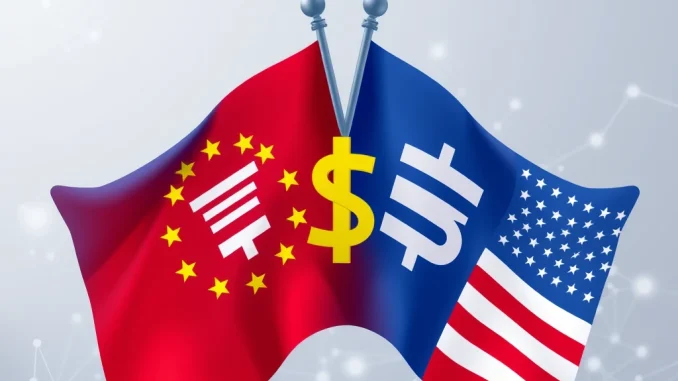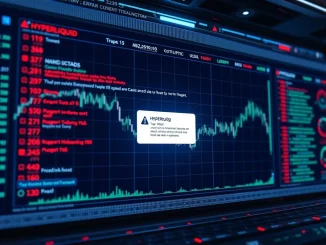
Buckle up, crypto enthusiasts! The global economic landscape is shifting once again, and this time, it involves a heavyweight clash between the EU and the US. Get ready as the European Union gears up to present its initial plan next week in direct response to President Trump’s latest tariff moves. What does this mean for the crypto world? Let’s dive in and break down this developing situation.
What’s the Buzz About EU Tariffs and Trump’s Move?
According to Jinse Finance, the European Commission is not sitting idly by. Spokesperson Olof Gill has announced that the Commission will be rolling out a preliminary plan early next week. This plan is a direct reaction to the broad import tariffs recently declared by U.S. President Donald Trump. Think of it as a strategic chess move in the complex game of global trade.
Here’s a quick rundown of what we know so far:
- Initial Roadmap First: The European Commission will first outline a preliminary roadmap. This is like setting the stage and defining the broad strokes of their counter-strategy.
- Consultations Next: Following the roadmap, the Commission will engage in crucial consultations. This involves discussions with member states – think Germany, France, Italy, etc. – and key industry representatives. Getting everyone on board is key for a unified and effective response.
- Final Measures and Vote: Only after these thorough consultations will the final measures be proposed. These measures will then be submitted for a vote. This democratic process ensures that all voices are heard before any concrete actions are taken.
But why should you, as someone interested in cryptocurrency and blockchain, care about EU tariffs and Trump tariffs? Let’s explore the bigger picture.
Why Do Trump Tariffs Trigger Global Reactions?
Donald Trump’s decision to impose broad import tariffs isn’t just a simple economic policy change. It’s a move that sends ripples across the global economy. Tariffs, in essence, are taxes on imported goods. When a country imposes tariffs, it can lead to:
| Impact | Description |
|---|---|
| Increased Costs for Consumers | Tariffs make imported goods more expensive. This cost is often passed down to consumers, leading to higher prices for everyday products. |
| Retaliatory Tariffs | When one country imposes tariffs, others often retaliate with their own tariffs. This can escalate into a full-blown trade war. |
| Disruptions to Global Supply Chains | Many industries rely on complex global supply chains. Tariffs can disrupt these chains, causing delays and inefficiencies. |
| Economic Uncertainty | Trade wars create uncertainty in the market. Businesses become hesitant to invest, and economic growth can slow down. |
For the cryptocurrency market, which thrives on global connectivity and economic stability (or sometimes instability, depending on how you look at it!), these factors are incredibly relevant.
The Looming Trade War and Its Crypto Connection
A trade war isn’t just about governments arguing over trade balances. It has tangible effects on financial markets, and yes, that includes the cryptocurrency market. Here’s how:
- Market Volatility: Economic uncertainty fuels market volatility. When traditional markets become turbulent due to trade tensions, investors might look towards alternative assets like Bitcoin and other cryptocurrencies as a hedge. This can lead to increased trading volume and price fluctuations.
- Currency Fluctuations: Tariffs and trade disputes can impact currency exchange rates. Changes in the value of major currencies like the Euro and the US Dollar can indirectly affect the price of cryptocurrencies, which are often traded against these fiat currencies.
- Geopolitical Instability: Trade wars are a symptom of broader geopolitical tensions. Increased global instability can drive interest in decentralized, borderless assets like cryptocurrencies, seen as outside the direct control of governments and traditional financial systems.
- Impact on Tech and Blockchain Industries: The technology sector, including blockchain and cryptocurrency companies, often relies on global trade for components, talent, and market access. Tariffs could impact the cost of hardware, software development, and international expansion for these businesses.
Therefore, the EU’s response to Trump tariffs isn’t just a political event; it’s an economic event with potential ripples into the crypto space. Traders and investors should keep a close watch on how this situation unfolds.
Could Blockchain Offer Solutions to Global Trade Friction?
Interestingly, while trade wars present challenges, they also highlight potential areas where blockchain solutions could be beneficial in the long run. Consider these points:
- Supply Chain Transparency: Blockchain can enhance transparency in global supply chains. By tracking goods on a blockchain, it becomes easier to verify origin, authenticity, and compliance, potentially reducing disputes related to tariffs and trade regulations.
- Streamlined Customs Processes: Smart contracts on blockchain can automate and streamline customs processes, reducing paperwork, delays, and bureaucratic hurdles. This could mitigate some of the friction caused by tariffs.
- Decentralized Trade Platforms: Blockchain-based platforms can facilitate peer-to-peer trade, potentially bypassing traditional intermediaries and reducing reliance on complex international trade agreements that are often at the heart of trade disputes.
- Secure and Efficient Cross-Border Payments: Cryptocurrencies, underpinned by blockchain, offer faster, cheaper, and more secure cross-border payment solutions. This can be particularly advantageous for international trade, making transactions less vulnerable to traditional banking inefficiencies and geopolitical risks.
While blockchain isn’t a magic bullet to solve all trade war issues, it does present a toolkit of technologies that could contribute to a more efficient, transparent, and resilient global trading system in the future.
In Conclusion: Watching the EU’s Next Move
The EU’s upcoming plan to respond to Trump’s tariffs is a significant development in the ongoing saga of global trade. For the cryptocurrency community, it’s a reminder that macro-economic events and geopolitical tensions have a real impact on the digital asset space. While the immediate effects might be market volatility and uncertainty, the long-term perspective could see blockchain technology playing a more prominent role in shaping a new era of global trade.
Keep your eyes peeled for the EU’s announcement next week. It’s a story that’s still unfolding, and one that could have far-reaching consequences for the world of finance and technology. Stay informed, stay vigilant, and navigate the crypto markets with awareness of these broader global currents!



